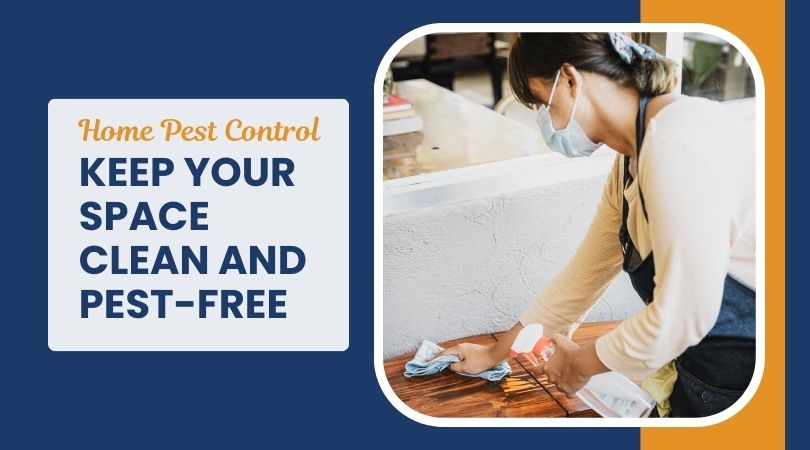Home Pest Control: Keep Your Space Clean and Pest-Free

Pre Purchase Inspections: Why Home-Buyers Need To Know
April 4, 2025
New Home Inspections – What’s Covered and What’s Often Missed
June 6, 2025Pests are a common nuisance that can infiltrate your home, causing damage to your property and creating an unhealthy living environment. Whether it’s ants marching through the kitchen or rodents nesting in your attic, home pest control is essential for maintaining a clean and hygienic space. This guide explores effective pest control solutions, their importance, and how you can ensure your home stays pest-free year-round.
Why Home Pest Control is Essential
When pests invade your home, they don’t just create an unsightly mess—they also pose serious health risks. From spreading diseases to causing allergic reactions, pests can affect your well-being. Effective home pest control ensures that your home remains safe, clean, and comfortable. Here’s why investing in pest control is a smart choice:
- Health Protection: Many pests, such as mosquitoes, rats, and cockroaches, carry harmful bacteria, viruses, and parasites. These pests can trigger asthma, allergies, and other health issues, especially for young children and elderly individuals.
- Property Protection: Pests like termites, ants, and rodents can damage your home’s structure, furniture, and wiring. Termite infestations, for example, can cause severe structural damage to wooden elements of your house.
- Peace of Mind: Knowing your home is protected from pests provides peace of mind. Regular pest control ensures that you don’t have to worry about unwanted guests invading your space.
How to Keep Your Space Clean and Pest-Free
To achieve a pest-free home, it’s important to implement a combination of preventive measures and treatments. Let’s explore some of the most effective methods for home pest control.
1. Regular Cleaning and Maintenance
Maintaining a clean home is the first line of defense against pests. Pests are attracted to food and water sources, and they thrive in cluttered, unhygienic environments. Regular cleaning and upkeep can significantly reduce the likelihood of a pest infestation.
- Wipe down surfaces regularly: Pests like ants and cockroaches are attracted to crumbs, spills, and food scraps. Clean countertops, floors, and cabinets daily to eliminate food sources.
- Vacuum and mop: Regularly vacuum carpets and mop floors to remove crumbs and debris that attract pests.
- Seal trash bins: Always use a tight-fitting lid on your trash bins to prevent pests like rodents and flies from getting inside.
2. Seal Entry Points
Pests often enter homes through tiny cracks and gaps around windows, doors, and other openings. To prevent pests from entering your home, seal these entry points effectively.
- Use weatherstripping on doors and windows: This not only helps with energy efficiency but also prevents pests from squeezing through gaps.
- Seal cracks and crevices: Inspect your home for cracks in the walls, foundation, and around pipes. Seal them with caulk or weatherproof materials to block pest entry.
3. Proper Waste Management
Waste is a prime attractant for pests. Proper waste management is an essential aspect of home pest control, especially when it comes to food waste.
- Empty trash regularly: Don’t let trash pile up inside the house. Remove garbage daily, especially in areas like the kitchen and bathroom where pests are likely to congregate.
- Store food waste properly: If you compost at home, ensure that compost bins are tightly sealed to prevent pests from feeding on them.
4. Maintain Your Lawn and Yard
Your yard can also be a hotspot for pest activity. Keeping your lawn and garden tidy can prevent pests from migrating into your home.
- Trim overgrown vegetation: Overgrown shrubs and trees can provide shelter for pests. Regularly trim plants and branches, especially those that are close to your house.
- Remove standing water: Stagnant water is a breeding ground for mosquitoes. Ensure that there is no standing water in your yard, such as in birdbaths, gutters, or plant pots.
5. Use Eco-Friendly Pest Control Solutions
For homeowners concerned about the environmental impact of chemical pesticides, eco-friendly pest control is an excellent alternative. There are several natural, non-toxic options available that are both effective and safe for your family and pets.
- Essential oils: Certain essential oils, such as peppermint, eucalyptus, and citronella, act as natural repellents for pests like ants, spiders, and mosquitoes. Use essential oil sprays around entry points and in areas where pests are commonly seen.
- Diatomaceous earth: This natural substance is effective against a wide range of pests, including ants, bedbugs, and fleas. It is safe for humans and pets but lethal to pests.
- Bait traps: Eco-friendly traps, such as those designed for fruit flies, ants, and cockroaches, can help manage pest populations without chemicals.
6. Hire a Professional Pest Control Service
While DIY methods can be effective, sometimes it’s best to enlist the help of a professional pest control service. A pest control expert can identify pest issues, offer tailored solutions, and treat infestations that may be difficult to manage on your own.
- Regular inspections: A professional service can schedule routine pest inspections to catch potential issues before they become major problems.
- Targeted treatments: Pest control experts use specialized treatments that are more effective than over-the-counter options. They can also apply these treatments safely, ensuring minimal exposure to harmful chemicals.
7. Preventative Pest Control Treatments
Even if your home isn’t currently infested, preventative pest control treatments can be a proactive approach to ensuring that pests don’t become a problem in the future. These treatments are designed to deter pests from entering or nesting in your home.
- Barrier treatments: These treatments create a protective barrier around your home, preventing pests from entering through cracks and crevices.
- Pest-proofing services: Professional pest control companies offer services that involve treating areas prone to infestations and applying long-lasting preventative treatments.
Benefits of Regular Home Pest Control
Implementing a consistent home pest control routine offers numerous benefits that go beyond just eliminating pests.

- Enhanced Health and Safety: Regular pest control helps eliminate health risks associated with pest infestations, such as respiratory problems, infections, and allergic reactions.
- Long-Term Cost Savings: Early pest detection and control can prevent costly damage to your property, saving you money in the long run.
- Peace of Mind: Knowing that your home is protected from pests gives you peace of mind and ensures a comfortable living environment.
- Environmentally Friendly: Eco-friendly pest control methods protect not only your home but also the environment.
Frequently Asked Questions
How often should I get my home inspected for pests?
It’s recommended to get a professional pest inspection at least once a year, or more frequently if you live in a high-risk area.
Are eco-friendly pest control solutions effective?
Yes, many natural solutions such as essential oils and diatomaceous earth are effective against common pests and safe for pets and children.
Conclusion
Home pest control is an essential part of maintaining a clean, safe, and hygienic living space. By adopting effective prevention strategies, sealing entry points, maintaining cleanliness, and opting for eco-friendly pest control solutions, you can keep your home free from pests year-round. Whether you choose DIY methods or hire a professional service, the key is consistency and vigilance. Take proactive steps today to protect your home and your health from the dangers pests can bring.




